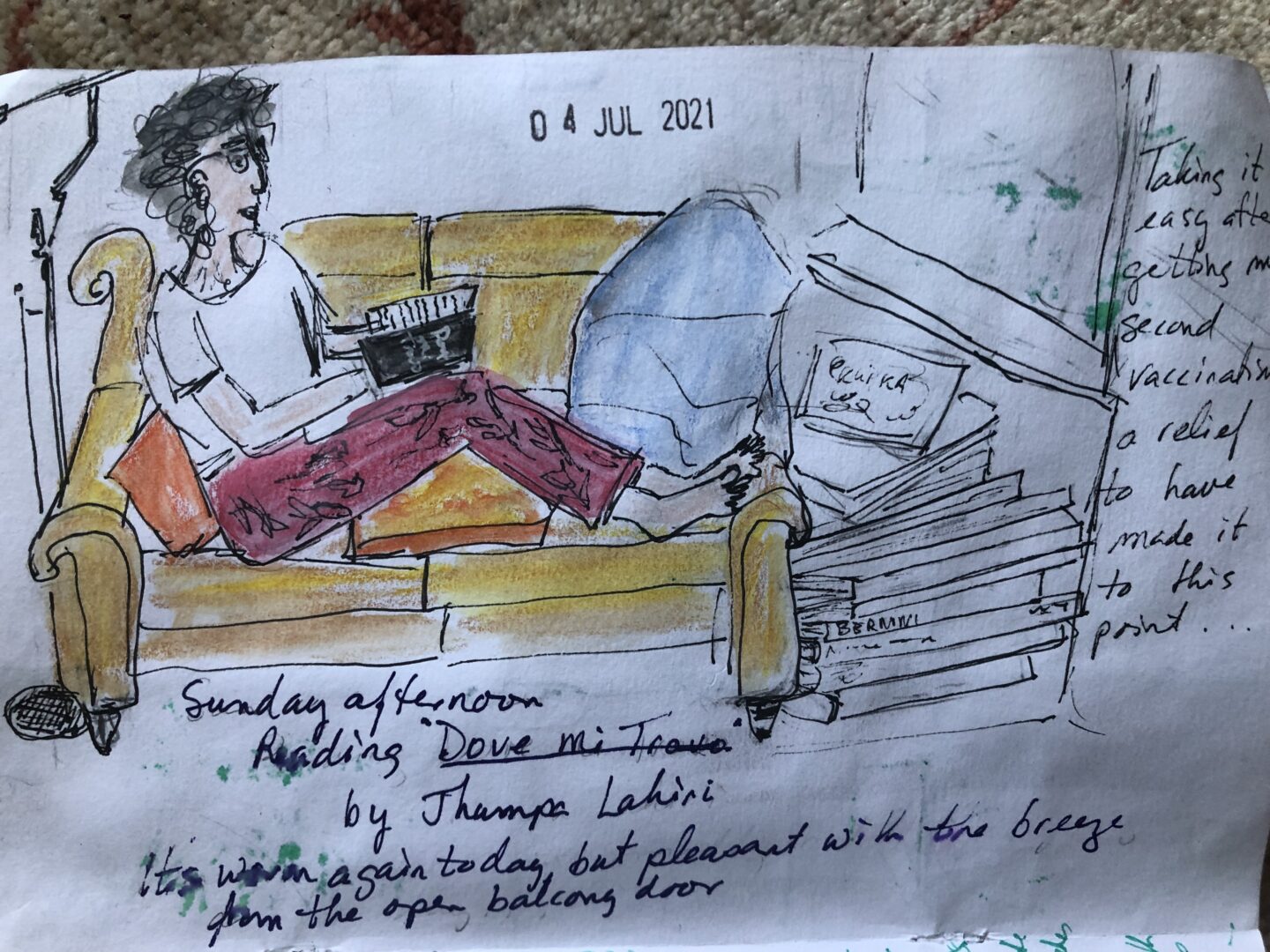
Summer Reading: Do you prefer to do your summer reading inside or outside? I like to mix it up, but my two favourite spots right now are: In the morning before it gets too warm, out on the terrace in the outdoor sectional, under the shade umbrella; In the afternoon, on the love seat, by the open balcony door. Unless it’s too warm even for that, and then I have to hole up in the bedroom where we have a small portable Air Conditioner, and a recently created small reading corner
But enough about where I read, and onto the books themselves. First of all, here’s the list of what I read in June (numbered according to each book’s place in my handwritten 2021 Reading Journal):
41. The Lost Children Archive. Valeria Luiselli. Literary fiction; Road trip; Contemporary American family; immigration; refugee children; art of documentary; children’s perspective
42. What We Carry, Maya Shanbhag Lang. Memoir; Mother-daughter; Aging parent; Dementia; Indo-American; immigrant narrative; high-achieving women
43. Sarajevo Blues, Semezdin Mehmedinovič, Trans. from Bosnian & with introduction by Ammiel Alcalay. poetry; essays; Bosnian war; trauma; witness; journalism (limitations, dangers of)
44. Burnt Sugar, Avni Doshi. Literary fiction; Mother-daughter narrative; set in India; women’s lives; dementia; artist’s life; mis-bildungsroman;
45. A Darkness Descending, Christobel Kent. Mystery; Set in Florence; Sandro Cellini series
46. In Altre Parole/In Other Words, Jhumpa Lahiri, trans. Ann Goldstein. Memoir: Writing; Italy/Italian; Language; Identity; Immigrant narrative
And now the entries from my 2021 Reading Journal. I’m going to include “typed” transcriptions below each entry, and I’d like to know if these makes a difference to the likelihood you’ll read each entry or not.
I borrowed Valeria Luiselli’s novel The Lost Children from the library and couldn’t spend as much time with it as I would have liked — so many other library patrons waiting for a copy of this prize-winning (Folio prize, Andrew Carnegie medal for Excellence in Fiction, critically lauded book). More information here.
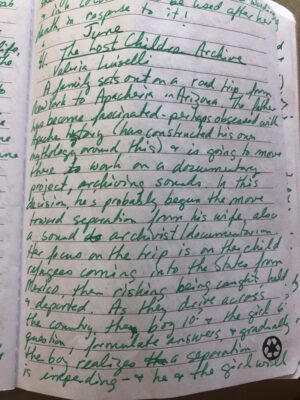
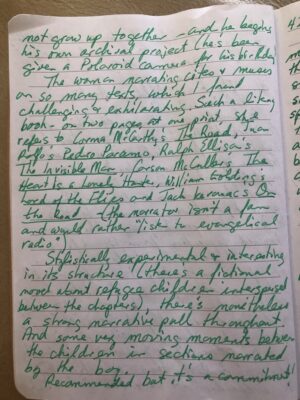 A family sets out on a road trip from New York to Apacheria in Arizona. The father has become fascinated — perhaps obsessed — with Apache history (has constructed his own mythology around this) and is going to move there to work on a documentary project, archiving sounds. In this decision, he’s probably begun the move toward separation from his wife, also a sound archivist/documentarian. Her focus on the trip is on the child refugees coming into the States from Mexico, then risking being caught, held, and deported.
A family sets out on a road trip from New York to Apacheria in Arizona. The father has become fascinated — perhaps obsessed — with Apache history (has constructed his own mythology around this) and is going to move there to work on a documentary project, archiving sounds. In this decision, he’s probably begun the move toward separation from his wife, also a sound archivist/documentarian. Her focus on the trip is on the child refugees coming into the States from Mexico, then risking being caught, held, and deported.
As they drive across the country, the boy, 10, and the girl, 6, question, formulate answers, and gradually the boy realizes a separation is impending — and he and the girl will not grow up together — and he begins his own archival project (he’s been given a Polaroid camera for his birthday).
The woman narrating cites and muses on so many texts, which I found challenging and exhilarating. Such a literary book — on two pages, at one point, she refers to Cormac McCarthy’s The Road, Juan Rulfo’s Pedro Paramo, Ralph Ellison’s The Invisible Man, Carson McCuller’s The Heart Is a Lonely Hunter, William Golding’s Lord of the Flies, and Jack Kerouac’s On the Road (the narrator isn’t a fan, and would rather “listen to evangelical radio”)
Stylistically experimental and interesting in its structure (there’s a fictional novel about refugee children interspersed between the chapters), there’s nonetheless a strong narrative pull throughout. And some very moving moments between the children in sections narrated by the boy. Recommended, but it’s a commitment.
I also mentioned this book and included a favourite excerpt on my Instagram book account.
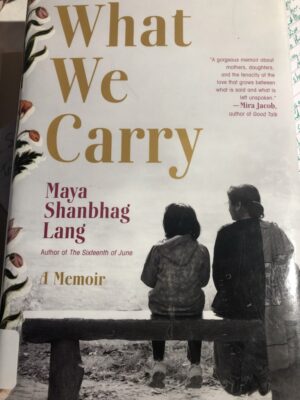
I can’t remember who recommended I read Maya Shanbhag Lang’s memoir What We Carry, but thank you! This was another I was lucky to get from the library.
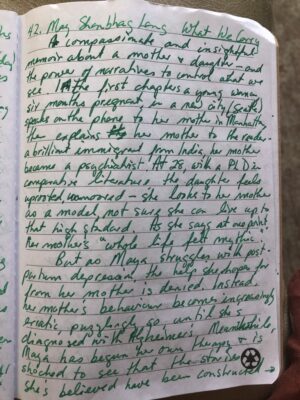
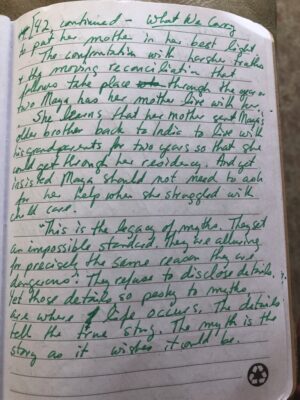
A compassionate and insightful memoir about a mother and daughter — and the power of narratives to control what we see. In the first chapters a young woman, six months pregnant, in a new (to her) city (Seattle) speaks on the phone to her mother in Manhattan, then explains her mother to the reader: a brilliant immigrant from India, her mother became a psychiatrist. At 28, with a PhD in Comparative Literature, the daughter feels uprooted, unmoored. She looks to her mother as a model, not sure she can live up to that high standard. As she says at one point, her mother’s “whoe life felt mythic.”
But as Maya struggles with post-partum depression, the help she hopes for from her mother is denied. Instead, her mother’s behaviour becomes increasingly errativ, puzzlingly so, until she’s diagnosed with Alzheimer’s. Meanwhile, Maya has begun her own therapy and is shocked to see that the stories she’s believed all her life have been constructed to put her mother in her best light.
The confrontation with harsher truths and the moving reconciliation that follows take place through the year or two Maya has her mother live with her. She learns that her mother sent Maya’s older brother back to India to live with his grandparents for two years so that she could get through her residency. And yet insisted Maya should not need to ask for her help when she struggled with child care.
Quotation from the memoir: “This is the legacy of myths. They set an impossible standard. They are alluring for precisely the same reason they are dangerous: They refuse to disclose details. Yet those details so pesky to myths are where life occurs. The details tell the true story. The myth is the story as it wishes it could be.” (This is the excerpt I included in my Instagram post.)
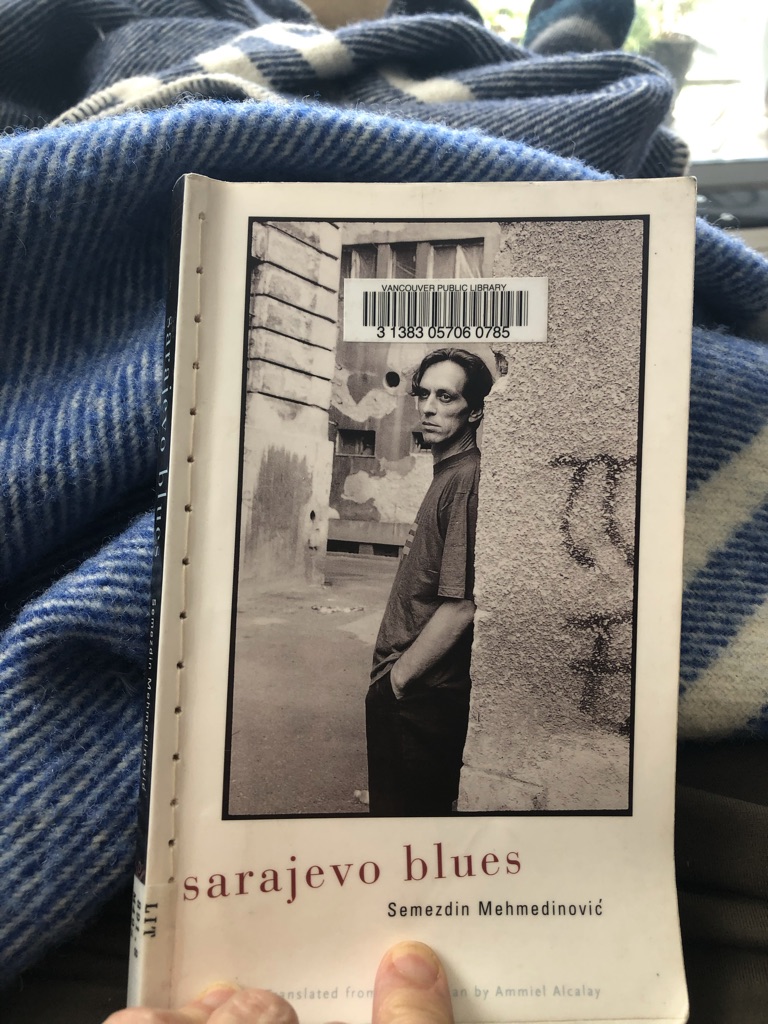
After reading Semezdin Mehmedinović’s novel My Heart, last month (thanks to Dottoressa’s recommendation), and after listening to Eleanor Wachtel’s interview with him on CBC’s Writers and Company, I was happy to find a copy of his much earlier book of prose pieces and poetry responding/testifying to the Bosnian War as he witnessed it from his home in Sarajevo.
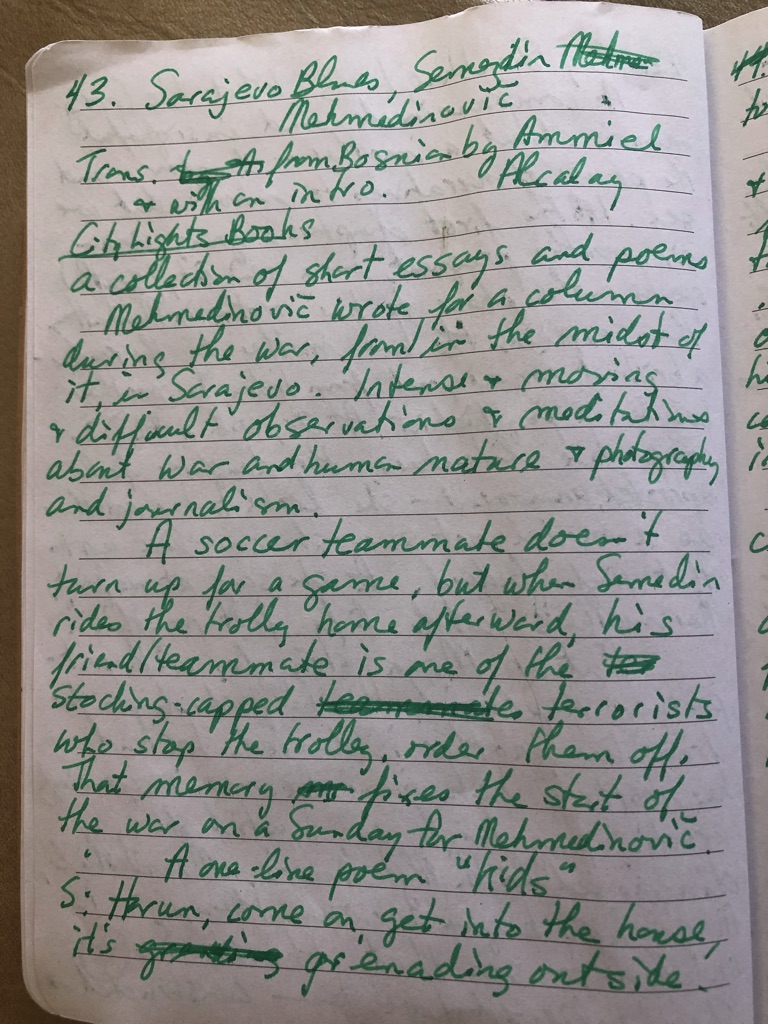 A collection of short essays and poems Mehmedinovič wrote for a column during the war, from/in the midst of it, in Sarajevo. Intense and moving and difficult observations and meditations about war and human nature and photograph and journalism.
A collection of short essays and poems Mehmedinovič wrote for a column during the war, from/in the midst of it, in Sarajevo. Intense and moving and difficult observations and meditations about war and human nature and photograph and journalism.
A soccer teammate doesn’t turn up for a game, but when Semezdin rides the trolley home afterward, his friend/teammate is one of the stocking-capped terrorists who stop the trolley, order the riders off. That memory fixes the start of the war on a Sunday for Mehmedinovič. It’s this demarcation between an ordinary day, friendly relations, and the violent transformation of one’s home, one’s view of the world, that’s so striking in this collection.
A one-line poem “Kids”:
S: Harun, come on, get into the house, it’s grenading outside.” (Actual words spoken by Semezdin’s wife, Sanja, to their young son, Harun)
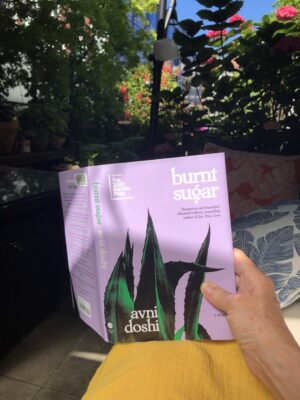
I’m so grateful for public libraries in general, Vancouver Public Library in particular — each of the books I read in June was borrowed from the library, generally within weeks of when I first requested them. Avni Doshi’s Burnt Sugar is another example.
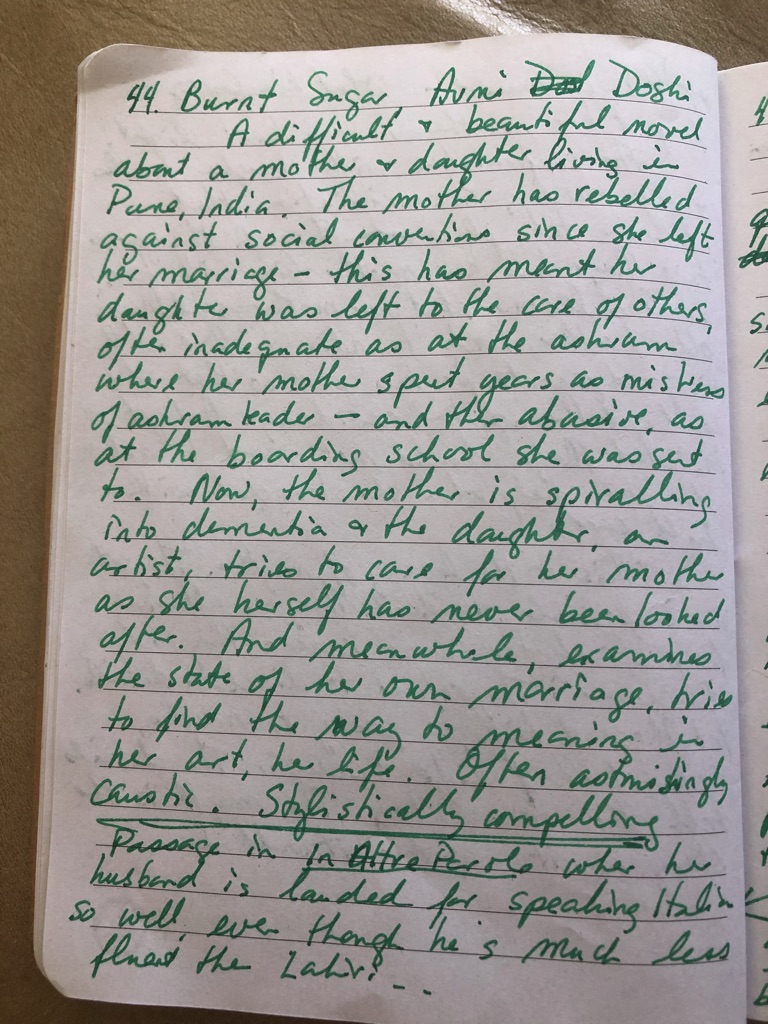
A difficult and beautiful novel about a mother and daughter living in Pune, India. The mother has rebelled against social conventions since she left her marriage when her daughter was a baby — this has meant her daughter was left to the care of others, often inadequate as at the ashram where her mother spent years as mistress of the ashram leader. And then abusive, as at the boarding school she was sent to. Now, the mother is spiralling into dementia and the daughter, an artist, tries to care for her mother as she herself has never been looked after. And meanwhile, examines the state of her own marriage, tries to find the way to meaning in her art, her life.
Often astonishingly caustic. Stylistically compelling. (My Instagram post here.).
I don’t know about you, but after I’ve read a few more challenging books in a row (or sometimes after only one of those that weighs heavily), I like to turn to something lighter, and for me, as you’ll know by now, lighter often means a murder mystery. Perverse, I know. . . (shrugs)
So I was happy to find Christobel Kent’s A Darkness Descending available as an e-book to download from the Vancouver Public Library and read on my now-ancient iPad mini.
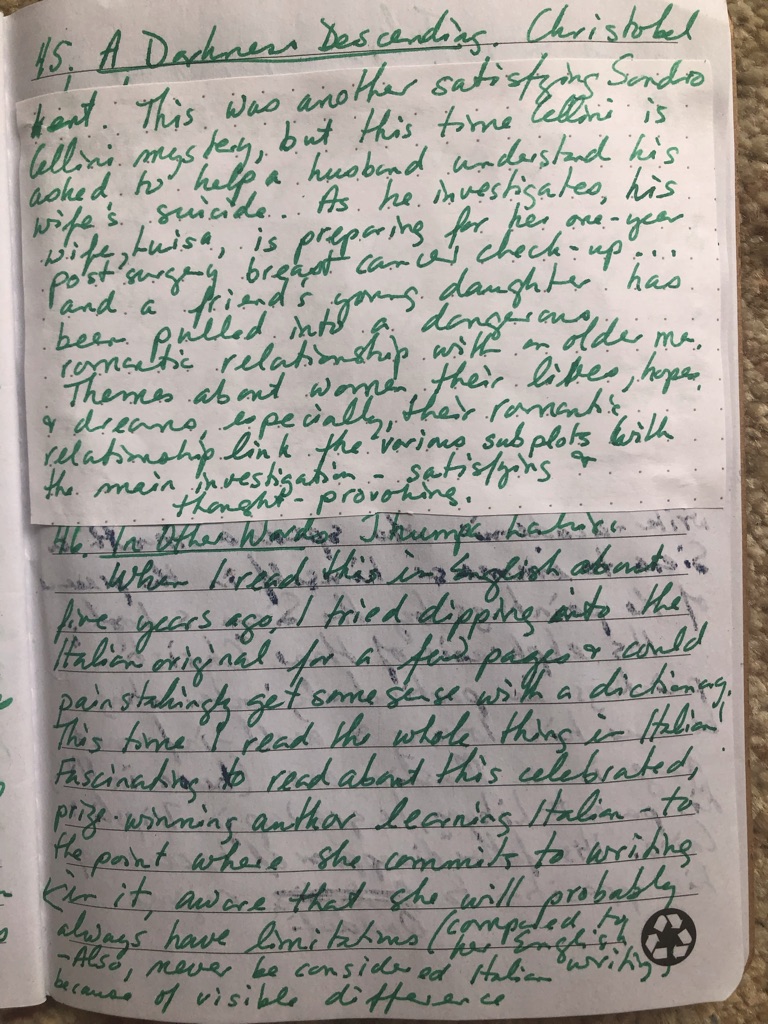 This was another satisfying Sandro Cellini mystery (wrote about others here, here, and here) but this time Cellini is asked to help a husband understand his wife’s suicide. As he investigates, his wife, Luisa, is preparing for her one-year post-surgery breast cancer check-up . . . and a friend’s young daughter has been pulled into a dangerous romantic relationship with an older man.
This was another satisfying Sandro Cellini mystery (wrote about others here, here, and here) but this time Cellini is asked to help a husband understand his wife’s suicide. As he investigates, his wife, Luisa, is preparing for her one-year post-surgery breast cancer check-up . . . and a friend’s young daughter has been pulled into a dangerous romantic relationship with an older man.
Themes about women, their lives, hopes, and dreams; especially, their romantic relationships link the various subplots with the main investigation. Satisfying and thought-provoking.
And moments like this, that give Kent’s characters such depth:
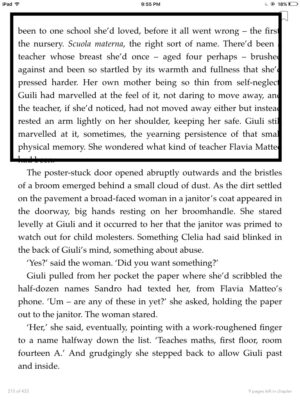
Below the entry for A Darkness Descending, is my Reading Journal’s final entry for June: Jhumpa Lahiri’s In Altre Parole/In Other Words. I read the book in Ann Goldstein’s English translation of Lahiri’s Italian back in 2016 and wrote about it here, in a post about “The Joys and Challenges (and Potential Shame) of Imperfection.”
I marvelled that Lahiri, a much-lauded, Pulitzer-winning American writer, should turn away from writing in English and risk writing her memoir about her relationship with the Italian language — in that language! At the time, though, I could only scoot my eyes over to the Italian page (across from the English one I was reading) and pick out a few words, a few phrases. This time, as you can read in my Reading Journal entry, was different.
When I read this in English about five years ago, I tried dipping into the Italian origianl for a few pages and could painstakingly get some sense with a dictionary. This time I read the whole thing in Italian. Fascinating to read about this celebrated, prize-winning author learning Italian — to the point where she commits to writing in it, aware that she will probably always have limitations (compared to her English writing)
Also, she will never be considered Italian because of her “visible difference.” Particularly poignant is the passage in In Altre Parole where her husband (who looks as if he could be Italian and of Italian heritage) is lauded for speaking Italian so well, even though he’s only said a few words, whereas Lahiri has had an extended conversation with no comment on her much more fluent Italian.
Recommended, for the writing, the thinking, but also simply for the exploration of what it means to follow a dream, realize its achievement.
And that’s it for the June portion of my Summer Reading. Now, as usual, I’d love us to chat about books a bit. Have you read any of these books? Others that you think might “read well” with them? What have you been reading and would you recommend any of that reading to the rest of us? (I know some of you will recommend books in my journal as ones you’ve recommended to me in the past — thank you!)
Many thanks for your wonderful book recommendations and blog posts. I’ve been studying Italian off/on for almost 2 decades (I’m an enthusiastic intermediate) so I was interested in Lahiri’s immersion experience and read “In Altre Parole” recently. I found her exploration of language learning thought provoking, in particular the acceptance of imperfection. I now consider my love of the Italian language a life-long endeavor and embrace the pleasure it provides – the pressure is off – I’m a work-in-process! I’m reading Funny Weather by Olivia Laing as she explores the nature of art during times of crisis “ the ways in which its concerned with resistance and repair.” Laing’s follow-on book “Everybody”, and Lahiri’s “Whereabouts” are next.
Author
Isn’t Lahiri’s memoir (and really, just the whole idea of her complete immersion in another language — and that willingness to let go of a need to master, to accept one’s vulnerability and imperfection). I like your approach, that accepting ourselves as imperfect speakers means we shake off the pressure and embrace the pleasure!
I don’t know Olivia Laing’s writing, although the quick search I just did shows me it would be interesting.
I read about a quarter of Dove Mi Sono but had to return it to the library before I got further. I’ll be curious to know what you think of it as Whereabouts. . .
Such a lovely sketch!
At home,I read mostly in bed,inside my bedroom,and everywhere I go and have an opportunity and a free moment-books on my mobile phone .At the seaside I read at home,at the beach,in the caffé (when not hypnotized by the sea)…..
I’ve read Burnt Sugar(very well written book-emotions and situations,as well as relationships,are so similar in all parts of the world,but there are always local specifics too,that add to the value of a good book) and C. Kent (love her books,especially the Sandro Cellini series)
Jhumpa Lahiri’s book has catched my attention the first time you’ve written about it-our italian language curves go in different directions,you are excellent- I don’t use it and am forgeting it rapidly
The other books go to the TBR pile (aaaah!)
I didn’t read Sarajevo Blues,would like to read
I’ve finished with Peter Diamond series and am reading Reginald Hill mysteries now,book after book …after, and in between, books that deserve a lot of my attention,emotions and concentration…like Hana by Alena Mornštajnová,an excellent book about life in a small Czech town around WW II years,about Holocaust and Nazi concentration camps,about families,wrong decisions and horrible consequences….highly recommend…
Joanne Ramos The Farm is a dystopian novel about surrogacy,the clients,managers and surrogate mothers…I like it,a lot of questions to think about…
The third one to recommend, is Edouard Louis’ The End of Eddy, poignant story about effeminate boy’s coming of age in a primitive,violent rural surrounding,abused,beaten and bullied for years,feeling completely isolated
Dottoressa
Author
I can believe you read in all those many places — you’d have to, to finish all the books you do!
I think you must have been the one who recommended Burnt Sugar — thank you!
Even though our Italian language curves are going in different directions, yours has so much stronger a base than mine — I wish I’d learned it much earlier. . .
Your description of The End of Eddy makes me think of Shuggie Bain. . . and right now I’m reading Rainbow Milk. These coming-of-age stories about/by gay men are so painful to read but also so important. And surprisingly beautiful. Will put these three titles you recommend on my list. But it’s a long list, as you know (as you have one yourself, just as long!)
Around 1 pm PDT the sun hits its perfect pitch for me to take my *breakfast* out on the broad deck off the kitchen and lounge. I have the sun at my back, but I’m more or less under the red umbrella that casts a pink glow on the pages of my current read. Since the deck is elevated above the garden, I feel I’m on a ship gazing into a sea of mostly hydrangeas, phlox, and lavender presently. My impulse is to shout, “Is there anything more glorious than summer reading outdoors?” but that surely depends on climate, comfort, and vista.
Most of the summer I’ve spent in the the thick of Flannery O’Connor’s complete short stories, which levied a toll of grim persistence as well as the reward of utter astonishment. More recently, I had just finished The Lost Children Archive (wavering pleasure and frustration for me), when I received from a friend a copy of Brian Doyle’s Chicago, which I am prematurely declaring my best book of Summer 2021. That may just be the Chicagoan in me. Move on I must, so to to Elizabeth Strout’s 2018 release, Anything Is Possible, followed by Lisa Napoli’s Mothers of NPR/ non-fiction story of Cokie Roberts et al.
Your suggestions and reviews are appealing, for me especially the Florentine mystery and [a bilingual edition of] In Altre Parole. I admire that you have tackled the pure Italian.
Author
Perhaps we need to put it to a vote? Summer reading outdoors or winter reading by the fire in a big old comfy armchair? Kidding, of course, as we’re probably better just to enjoy each on its merits as they arrive. . .
Grim persistence rewarded (occasionally?) by utter astonishment. . . I recognize this formula (pattern? equation?)
And thank you for adding lists of books the rest of us gathered here might add to our lists. Your mention of Flannery O’Connor makes me think it’s time for me to pluck a Mavis Gallant collection off my bookshelves for a reread. . . I wonder if they would ever have met
I’ve been thinking about translation as I have Swann’s Way/The Way by Swann’s on my nightstand…a paragraph or two before sleep, then I can think about it as I drift off. In keeping with the first chapter (on going to sleep and waking).
Dove Mi Trovo says ‘where I find myself’ to me which is quite different from ‘Whereabouts’. (a happy little while thinking about that) Did Jhumpa Lahiri say she would not translate her own works into English as she would inadvertently change the meaning? (Or maybe that was someone else. I have been listening to podcasts about books and reading. I have been trying with medium success to stay away from screens but I like a good listen.)
Oh! If you could. You mentioned some language podcasts you were listening to a while ago (weeks, months, even years, who knows), but when I try to search back for them I have no luck (can’t narrow down enough). Were they all French or Italian as well?
Bon week-end/buon fine settimana, in the spirit of the comment 🙂
Author
My copy has it Swann’s Way, the Moncrieff/Kilmartin translation. . . so do you have both that (or another) translation and the Lydia Davis, and your somnolent self drowsily compares the two as you shift into dreaming? I quite like this idea, actually, of the paragraph or two, which I could take on without any guilt about not rereading “the whole thing” — as it has, my copies just collect dust. . . have for decades.
I wondered the same thing about Dove Mi Trovo — I’ve read about a third, but had to return, and now the copy of Whereabouts is available, the library tells me. Not sure I want to shift to reading it in English, but I’m curious to see how different that will feel, whether it will affect the overall tone. Apparently, Lahiri translated the novel herself, whereas she was not at all interested in doing that for In Altre Parole — perhaps she’s just more comfortable shifting between the two now, settled enough in her Italian that she needn’t resist leaving it, knowing she can fit back easily?
Just for a start re podcasts: I think you might like Strade Narranti and Pensieri e Parole in Italian and perhaps Transfert, La Poudre Inner French Kiffe Ta Race in French. I like Change Ma Vie and have mentioned that recently — a life-coaching program spoken in very clear French.
No, I have only the Lydia Davis translation but just threw in the two titles as they were an example of what I was going to say.
But oh ha ha ha you are the worst of influences as wouldn’t it be fun to read the two back and forth? I am NOT I repeat NOT going to order another translation to do that. There are seven volumes after all. And my literary budget has been going toward afternoons spent in Sicily with my fictional boyfriend Montalbano (in the real-life heat, under a big umbrella, with a cold drink).
What a fascinating list! I mostly read indoors at the moment, in a favorite chair, in bed, at a desk, waiting at doctor’s offices or during chemo infusions. I love reading outdoors, but it is mostly too hot this summer, mid to upper 90s, and I haven’t yet set up a comfortable outdoor reading nook, although I will.
As to the books themselves, I think we have no overlap here, although your descriptions make me wish to read almost everything. Lost Children Archive and Burnt Sugar are both on my stack, and have been for some time, as is Rainbow Milk, which I see in the comments you are reading now. I think In Other Words as well and am intrigued by the idea of rereading it in Italian. Your words about Lahiri’s writing somehow make me think of Arundhati Roy’s collection of essays, Azadi, which are probably more about India and the social and political situation, but also about literature and language and how the development of culture and understanding of the world is in and of itself an act of translation. There is probably no similarity, and yet, this little microcosm, your rereading of Lahiri coinciding so closely with my reading of Azadi, and the various thoughts swirling about in my head, makes me think this book may need to swirl closer to the top of the list, if of course I catch it before it sinks back down.
Author
I agree, those temperatures are too hot for outdoor reading!! Whew!
Just finished Rainbow Milk — I would recommend it, with reservations for those who’d prefer not to read graphic sex scenes.
I haven’t read Azadi (and impressed you did, after The Ministry of Utmost Happiness ;-). . . it does sound as if there are productive points of comparison between them. The kind of thinking-play that always engages and pleases me. Go at it! 😉
I always think I will read outside on the patio but then quickly retreat indoors, often on a chair where I can see the garden but it is cooler. My cat sometimes joins me. Or else the bedroom. probably the best book I have read this month was Hamnet by Maggie O’Farrell. I realize that many will not read it because of the subject matter but I liked it. there were two books which dealt with the idea of what if we were to have made other choices in our lives. The Midnight Library by Matt Haig and the Book of Two Ways by Jodi Picoult. One uses magic realism, The Midnight Library, the other a story of a woman trying to go back 15 years to her old profession and an old love. It was a coincidence that I happened to read them in sequence but they started me thinking of the choices I had made as a young women, like what if had asked Tom instead to Bob to that dance my junior year in college, or what if I had followed my early interest in science and the natural world instead of becoming a psychologist? anyway, even if I would not have given the novels a high rating they were thought provoking and isn’t that the job of literature in any case. Also read The Exiles by Christine Baker Kline about the lives of women in the 1800’s who were sentenced to prison for minor offences and then sent to Australia. My Global book club is on a break for the Sumer so not reading anything in translation at the moment. I am about to go off on a trip to favorite island for a week. packing Mexican Gothic by Silvia Moreno-Garcia which was recommended . And hoping to explore the local, arty, funky independent bookstore there as part of the vacation.
Author
We have a comfortable place to read outside here — until mid, maybe late, morning when it gets too warm for me. But otherwise, I’ve been like you and have generally preferred an armchair inside by an open window that lets me see and hear the garden without having to swat bugs away.
Okay, I really must get a copy of Hamnet — it’s been recommended to me so often, always with enthusiasm, and I can’t think why it keeps slipping out of my sight (although the 147 readers ahead of me on the library Holds list is part of the reason!). I haven’t read that Jodi Picoult book, but I read (and wrote a bit about here, a few months back) The Midnight Library and found it a provocative and thoughtful way to respond to depression and suicidal ideation. I admire Matt Haig’s advocacy on mental health issues And it’s always interesting to think about what those earlier choices might have led to, what we’d have traded away. . . I’ve just looked up Mexican Gothic — not my usual genre, but such good reviews. Hmmm, maybe? Sounds like the perfect summer page-turner!
Thanks for these reviews. I haven’t read any of these books–and the ones about mother-daughter relationships seem particularly interesting. I’ll check them out.
I am an inside reader. I try to read outside in my beautiful and quiet garden but I am either distracted by birds etc, or find the light too bright.
Author
Thanks for taking time to comment, Elaine. I really recommend the memoir, What We Carry.
And I know what you mean — those birds can really be distracting! 😉
I don’t know how I came across your blog, but it caught my attention, probably for the literature and arts focus. I am also Canadian and speak Italian. I have always loved to read and have an academic background, but not in the arts. I am certainly no literary critic! My partner of more than a decade is Italian and lives in Italy. I divide my time between Florence and Ottawa (or did, before the pandemic). We have spoken Italian exclusively since 2010, so I am fairly fluent at this point, although there is always something to learn. I would like to dedicate more time to reading in Italian, which is why this post caught my attention.
When In Altre Parole came out a few years back, I was in Florence and attended a book signing and reading that Jhumpa Lahiri gave at one of the bookstores there. It struck me then, as I had always been struck when reading her writing in English, is that she is a melancholy person. I’ve always found the outsider narrative in her fiction to sing out and that was clear in the talk that she gave. She gives the impression of being uncomfortable in her own skin, despite her elegance and poise. I understand on an intuitive level the need to switch to Italian in her writing, as I also find escape in Italy from a culture (North American mainstream) in which I have never quite felt at home (despite having been born and raised in Canada by Anglo parents (and a ninth-generation Canadian at that!)). It’s not that I don’t appreciate aspects of being Canadian, but I find I’m able to inhabit certain parts of myself in Italy and in the Italian language that I don’t have the same opportunity to explore here. When I was in my twenties (now in my fifties) I lived in Asia and Oceania and experienced a similar joy in inhabiting different elements of myself there, but never to the same extent. I also I find these things in French, but for whatever reason, Italy seems to have been my destiny. Maybe I like to gesticulate wildly!
I had Jhumpa Lahiri’s most recent book on my to-read list, but I’m waiting until life returns to some semblance of happy before I tackle her melancholy! The pandemic has been truly challenging for my family given that my partner is also caregiving for an elderly parent in Florence, which of course has complicated the situation about nine-fold over the last eighteen months. Here’s to better times ahead for those of us with family abroad.
In any case, I just thought I’d say hello and that I like your blog.
Author
I’m delighted to meet you here, Stephanie — and thank you for sharing the description of Lahiri’s talk in Florence — lucky you! I can’t help envying your facility with Italian and your opportunity to spend much of your life in Italy — but I know the cost of the separation, although from a different perspective., as my daughter lives near Rome with her husband and my granddaughter. I haven’t seen them since December ’19, and it looks as if there may still be a hurdle or two before we’re together again. . .
Much to think about in your comment — Lahiri’s writing and her personality, the possibilities that exist for our identities to expand or slide a bit sideways, even, in other languages. Here’s to future conversations.
Lovely to meet you here, too. I read back a few posts and read that your daughter lives near Rome. It must be difficult to be separated from your family in this way. I am trying to decide whether I will hop on a plane in the near future to visit my partner and his family. There are so many considerations, largely around the elder caregiving situation. I’m also risk averse and disinclined to travel, and wouldn’t consider it for tourism, but it is reaching a point at which I must. We shall see. Fingers crossed for all of us. Of course, the most important thing is that we all remain healthy and we are vaccinated.
I look forward to reading through your book recommendations (and those of your commenters). I used to be a confident reader, but in recent years my work has been very busy (and the past year has been exceptionally busy as a result of the pandemic). My mental energy has been limited for deep reading and I’ve become lazy and my attention span more limited for pleasure reading. Your reading posts have inspired me to dig in again.
I was thinking again about the Lahiri book and particularly about the perception by Italians of non-Italian Italian speakers. Over the years I have often received flattery about my grasp of the language, but I believe that that stems from a part of the Italian culture that can be somewhat insincere with strangers (and particularly with North Americans). I’ve been told repeatedly that the truth is that the default impression of North Americans is that we are “beasts” from a cultural point of view. Once you speak the language well enough, and more importantly understand the culture well enough, the dialogue shifts. I wonder about Lahiri’s experience of this shift. This may be more evident in her most recent book. Speaking the language and understanding the culture are different things. I’m still on the road to understanding the culture, which I imagine will be a lifetime pursuit. I imagine that your daughter has interesting thoughts about this, too. Cheers!
I’m limiting my exclamation points this time. 🙂
Author
Many interesting points here, Stephanie, especially in your last paragraph. I often get that same type of compliment about my grasp of language in France, and often I receive it as an example of “politesse,” not sure how sincere it can be. But I think there is that element of gratitude that I’m obviously putting a credible effort into speaking the language.
And I absolutely agree that speaking the language and understanding the culture are two different things — and recognizing that the little bit one knows about another culture is just that: a little bit! Culture’s rarely monolithic, is it?!
After I wrote the comment I felt a little bit silly, but I think I believe it to be true. It took me a long time to realize how different my personal directness was from the way that Italians usually speak to each other (or at least to me). It took me a long time to accept also that I was occasionally being cheated, when I thought they liked me and were impressed by my language skills! That said, now that I am so deeply embedded in an Italian family and friendship group, I also see how deep and strong the ties are. Once you are “in” in Italy, you will be defended and cared for to the end. I suppose the process would be boring if the adventures were more linear.
I haven’t spent very much time in France, but I remember an interesting conversation I had with a French Canadian woman I met on a return trip from Italy one time. She was living in France full-time with a French partner at that point. I remember her saying that the conversation in France still bewildered her. She said that they could talk and talk for hours about nothing – the art of the conversation, really – and that she had grown to understand that her directness and transparency were not appreciated or understood. It was interesting and not dissimilar to my experience in Italian conversation. My own French has become incredibly amusing as Italian has taken over my brain – with Italian words frequently replacing French ones. I can always tell I’ve gone off the deep end when the person I am conversing with gives me long stares. My partner always says when we are in France that I am like a deer in the headlights speaking French, because I’m so afraid of my brain going onto the wrong track.
In any case, I apologize for leaving you such long, rambling comments…I tend to write to understand what I think. I’m in a reflective mood these days as I consider the options. I haven’t seen my partner since January 2020, because of the pandemic and caregiving situations, so the context is bewildering after so many years spending large chunks of my life in Italy. I look forward to reading your most recent entry.
Author
No apology necessary! Your comments about communication/conversation style and/or personality resonate with me — I think out loud in an engaged, sustained conversation, and I can tell that with many French friends and acquaintances it would be better if I made it clear I knew exactly where my sentence was headed when I set out. My husband’s French vocab and grammar isn’t as solid or extensive as mine, but he’s much better at structuring his points for a French listener.
I also relate to the confusion of French and Italian — words migrate helpfully 😉 from one language to the other. Se and Si are the biggest little problems.